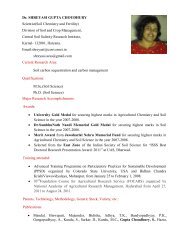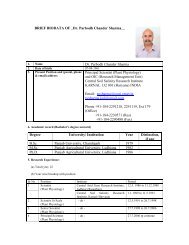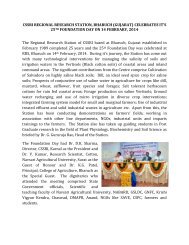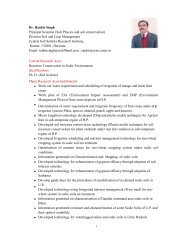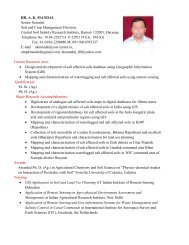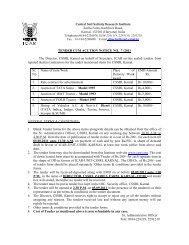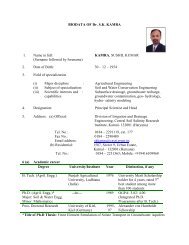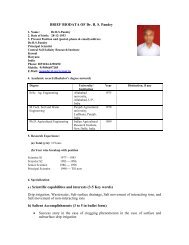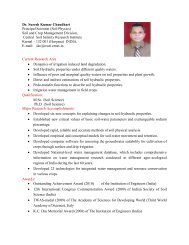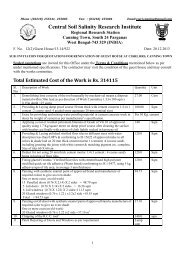Dr. KRISHNA MURTHY, S. L. Scientist (Plant ... - CSSRI Karnal
Dr. KRISHNA MURTHY, S. L. Scientist (Plant ... - CSSRI Karnal
Dr. KRISHNA MURTHY, S. L. Scientist (Plant ... - CSSRI Karnal
- No tags were found...
Create successful ePaper yourself
Turn your PDF publications into a flip-book with our unique Google optimized e-Paper software.
<strong>Dr</strong>. <strong>KRISHNA</strong> <strong>MURTHY</strong>, S. L.<strong>Scientist</strong> (<strong>Plant</strong> Breeding)Division of Crop Improvement<strong>CSSRI</strong> <strong>Karnal</strong> 132001Email: kmurthy@cssri.ernet.inCurrent Research Area: Extensive and systematic phenotyping for salt tolerance gene in rice.Genotyping for mapping population for salt tolerance gene in rice.Transfer of salt tolerance genes to popular varieties through Marker AssistedBack Cross method in Rice.Establishment of National rice data base.Evaluation of salt tolerant transgenic rice.Coordination, planning and execution of breeding for salt tolerance in Rice.Development of salt tolerant and basmati rice genotypes.Qualifications:DegreesB.Sc. (Agriculture)M.Sc. (<strong>Plant</strong> breeding)Ph. D. (<strong>Plant</strong> breeding)Board / UniversityUniversity of Agricultural Sciences, Bangalore, KarnatakaMarathwada Agricultural University, Parbhani, MaharashtraUniversity of Agricultural Sciences, Bangalore, KarnatakaMajor Research Accomplishments (up to five): Phenotyped two mapping populations CSR 11 x MI 48 and CSR 27 X MI 48 for 2years. Screened SSR markers in the mapping populations and 21 saltol markers used toscreen and validate in genotypes and wild relatives in rice. Developed F 1 s to transfer the salt tolerant genes to the popular varieties andidentified the polymorphic saltol markers among these parents. Created genetic variation with respect to salt tolerance by different hybridizationmethods in rice. Developed the pass port data of around 7000 rice accessions for 30 traits.
Evaluated the eight TPSP transgenic events in transgenic glass house.Developed different combinations of crosses to combine the salt tolerant genes inhigh yielding and basmati back ground and screened and advanced thegenerations.Indentified high yielding elite genotypes under salt stresses.Awards: Awarded ICAR JRF during M. Sc degree programme. Awarded ICAR SRF during Ph.D. degree programme.Training conducted (up to five): An International training programme on Use of Poor Quality Water in Agricultureorganized from 23 rd November to 6 th December, 2011 at the Central Soil SalinityResearch Institute (<strong>CSSRI</strong>), <strong>Karnal</strong> - as resource person.Training attended (up to five): Training on "Data Analysis using SAS" from 24-31 st January, 2011 at NDRI<strong>Karnal</strong>. Model training course on integrated water resource management and use ofpoor quality water in agriculture from 23 to 30 Nov 2011 at <strong>CSSRI</strong>, <strong>Karnal</strong>. An international training programme on “Molecular Marker Techniques and <strong>Plant</strong>Transformation for Crop Improvement” 18 th Dec 2007 to 9 th Jan 2008 conductedat UAS Bangalore.Publications (up to five): Krishnamurthy, S. L., Panesar, B. Kumar, V. Preeti, Chauhan, M and Sharma,S. K. 2011. Assessment of Genetic Diversity of rice for salinity tolerance by usingsaltol markers. International symposium on plant biotechnology towards toleranceto stresses and enhancing crop yield. Ranchi, Jharkhand, India. CI-35 p 97. Dushyantha Kumar, B. M., Shadakshari, Y. G. and Krishnamurthy, S. L. 2010.Genotype x Environment interaction and stability analysis for grain yield and its
components in Halugidda local rice mutants. Electronic Journal of <strong>Plant</strong>Breeding, 1(5): 1286- 1289. B. M. Dushyantha Kumar, N. E. Thyagaraj, Ramachandra C. and S. L.Krishnamurthy. 2007. Stability analysis for grain yield and yield components inred rice Internat. J. agric. Sci. 3(1):145-147Book chapters: Gautam R. K, Singh R. K, Singh N. K and Krishnamurthy S. L. 2011.Harnessing Genomic Tools for Improving Salt Tolerance in Rice: Prospects andProgress. 99 299-313. In: Muralidharan K and Siddiq E A (Eds). 2011. Genomicsand Crop Improvement: Relevance and Reservations. Institute of Biotechnology,Acharya NG Ranga Agricultural University, Rajendranagar, Hyderabad 500030India. Krishnamurthy, S. L. 2011. Breeding for salt tolerance in rice. In: Managingpoor quality water for sustaining agriculture. (Eds. H. S. Jat, Styendra Kumar, R.L Meena, R. K. Singh, R. K. Yadav and D. K. Sharma. Central Soil SalinityResearch Institute, <strong>Karnal</strong>, pp. 117-124. Krishnamurthy, S. L. 2010. Breeding for salt tolerance in rice. In: Use of poorquality water in agriculture. ( Eds. R. K. Yadav, R. L. Meena, H. S. Jat, R. K.Singh, K. Lal, and S. K. Gupta. Central Soil Salinity Research Institute, <strong>Karnal</strong>,pp. 199-207.Guided for dissertation (Research part) for post graduate students - 2Hands on training on Rice Biotechnology - 1




